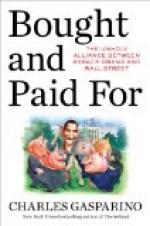When, therefore, one evening at a neighbor’s party, she happened to meet a young man who went considerably out of his way to pay her attention, she was greatly flattered and gratified. The very novelty of it startled her. Until now none of the eligible young men had so much as looked at her. Virginia, quite innocently, of course, had always monopolized their society. But this particular young man, whose name was James Gillie, seemed not in the least attracted to Virginia. In fact, he rather avoided her, appearing to be somewhat intimidated by her well-bred manners and cultured conversation. He made no secret of his preference for the homelier virtues of the elder sister, whose irrepressible propensity for picturesque, up-to-date slang and free-and-easy style put them on a more equal social footing. So began an acquaintance which resulted in the young man becoming a frequent and intimate visitor at the Blaine home.
Mr. James Gillie was an original in more ways than one, and it was some time before either Mrs. Blaine or Virginia could bring themselves to approve Fanny’s liking for a young man with ways so uncouth and vulgar and whose antecedents were obviously so plebeian. Of Irish parentage, but American born, James Gillie was a product of the newest America, the typical gamin of New York’s streets, fresh and slangy in speech, keen to the main chance, not over scrupulous, shrewd and calculating. Fair and slight in build, he was about twenty-six years old and his upper lip was adorned with a few thinly scattered hairs, which he proudly termed a moustache. Otherwise he was unintelligent and ordinary looking, one of the many thousands of New York young men who, graduates of the slums, have been left to shift for themselves, and whose chief intellectual pastime has been standing on street corners reading baseball returns. Not only had he no education, but he was rather proud of the fact, affecting to despise bookish people as prigs and “high-brows.” Incompetent and lazy, without any real ability, he worked only because he had to, and his standing grievance was that he was misunderstood, unappreciated and underpaid. The one good side to his nature, and the one which, perhaps, appealed most to Fanny, was the unconscious possession of a rich fund of humor. He was funny without intending to be, and this not only made him a diverting companion but ensured him a welcome everywhere. With the straightest of faces, he would say funny things in so ludicrous a manner that a roomful of people would go into convulsions. He laughed with them, not realizing they were laughing at him, but ever preening himself on being a very witty and clever person indeed. His greatest fault was inordinate vanity. He had the highest opinion of his own capacity, and he could never understand why capitalists generally did not tumble over each other to secure his services. At the present time he was earning the magnificent salary of ten dollars a week as shipping clerk, but




